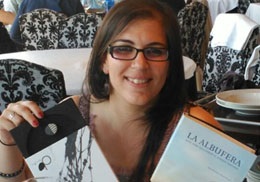
She received an award for her international thesis “Zooplankton assemblages in a Mediterranean restored area: patterns and processes of colonization and establishment” directed by doctors Javier Armengol and Raquel Ortells, of the Department of Microbiology and Ecology of the University of Valencia.
In 2002 she started her degree in Environmental Sciences at the University of Valencia and in 2005 she began her collaboration in the Department of Microbiology and Ecology of the same institution. Simultaneously she studied the Master’s Degree in Biodiversity (specialty in ecosystems) between 2008 and 2009 and was awarded an FPI grant associated with the project “Patterns of colonization and dispersal of zooplankton at a local scale” of the Ministry of Science. Between 2011 and 2012 she did research stays at the University of Hull in the United Kingdom. Finally, in 2016 she read her thesis and since 2017 has a postdoctoral contract of the Valencian Government that has allowed her to do part of her research in Chile with a project of Mediterranean aquatic metacommunities and collaborate with local researchers, where she will request the following postdoctoral contract.
What difficulties have you encountered while undertaking the thesis?
As my work focuses on the temporary lagoons, we depend on rainfall and the years of sampling (2007-2011) there was abundant rainfall. I do not imagine having done the thesis the subsequent years of drought, I would not have had any data! The rest in general went well, four years of monthly sampling are tiring, but it was worth it, and working in the flocks of La Devesa is a pleasure. I am very grateful to everyone (there was never a lack of helping hands) that helped or supported in one way or another.
Fortunately, I obtained the Training Fellowship for Researchers in the last year previous to the crisis, in which the cuts also affected the projects with an assigned fellow. I greatly admire the colleagues who do thesis without a scholarship (which are many) and according to statistics, are the most successful.
What continuity does your research have?
The proposed work demonstrates how important it is to know how the work of restoring water bodies is carried out. And also the knowledge, about the presence in our territory, of key animal species that unfortunately go unnoticed and that probably disappear due to the effects of climate change that we suffer and will suffer.
What do you think your research contributes to the scientific community as a whole and to society? And to you?
At a scientific level, we had a series of lagoons sampled from point zero of life (after the restoration), which was an incredibly good and unique scenario to test ecological hypotheses at the genetic, population or community level. Today we have quite a few quotations from the articles and counting, so I hope it continues to provide a lot of knowledge.
Unfortunately, scientists still have a lot of work to do to transfer our knowledge to society or to professional disseminators. The general contribution of this research is knowledge about our ecosystems, about how the human hand has transformed our natural landscapes, but that, with will, we have the capacity to restore part of the damage. Specifically, in my thesis, I provide information on how wild urbanism destroyed La Devesa (dunes and sheepfolds) in the 60s, but also how, years later, social and environmental awareness pressured to recover the territory and with it, the species of flora and fauna which we can now enjoy in an emblematic environment for Valencian society.
The work done over the years has allowed me to develop professionally and personally, it is clear to me that I want to continue researching here or wherever I am comfortable and that poses a challenge for me as a researcher and as a person.
What applicability can your work have?
Knowledge is the most powerful tool of applicability that we have, not only the scientific community, but society in general.
Does getting a Doctorate facilitate employability?
At the end of the thesis, with no scholarship left, I worked as an environmental educator in the València City Council and the Municipal Transport Company. To be doing my thesis was attractive for the contracting entities. To continue doing science, a PhD was fundamental. I do not know what would happen if I tried to join the private sector, I know all kinds of cases, it depends a lot on the specialty. Biodiversity, although essential for us, is far from being a private or political priority.
Would you recommend starting doctoral studies? What advice would you give to a person who wants to get a PhD?
I would only recommend doing them if you like the theme and the environment, and the people with whom you have to work side by side, day after day. They are too many hours a day, days a year and years in a life to do something you do not like or to be in an environment that does not fulfil you.
Have you actively participated in outreach activities and scientific communication? How important do you think these activities are?
Directly with the publication of two book chapters for the general public. Indirectly I try to follow, read and communicate with scientific disseminators. It seems fundamental to me that we communicate, directly or indirectly (through disseminators) our work. I really like to see how in the last 10 years things have improved. Now society talks about scientific issues from different areas, but talking and having a lot of information available does not mean being well informed. Unfortunately, we also observe other pseudoscientific phenomena that leave me jaw dropped in the 21st century; climate change deniers, anti-vaccine people, flat-earthers, etc. Those of us who do research, dissemination and some willing public authorities, have to use simpler and more direct ways and languages, go faster than these trends that gain followers day by day.
Images:

.jpg)











